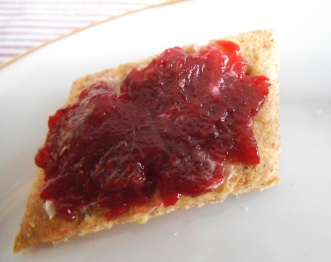Family Friday
My Paul and I get along really well. At least five nights out of any given week we fall asleep laughing our heads off at some stupid, sleepy word-joke that one of us makes just before we drop off to dreamland. We share some similar hobbies and have some similar interests. We do have our off-moments, but these are far fewer and much less traumatic than some other “off-moments” either of us have had in previous relationships. All the same, we are pretty different from each other in a lot of ways, and given the fact that our courtship didn’t get off to the most auspicious start, sometimes we look at each other in wonder and say, happily but still with some astonishment, “How did this happen, anyway?”
I guess it follows that two such different people might come from two very different families. The quick way to describe it (which only works if you’ve seen My Big Fat Greek Wedding) is to compare our two families to the ones in My Big Fat Greek Wedding–only with Paul’s family being the boisterous one with lots of relatives and my family being the smaller, more straight-laced one. It’s not a totally accurate description, but it at least gives you the right general impression.
By the time I met my Paul for the first time, I had already also met or at least communicated with numerous other men who described themselves online as “what you see is what you get,” and I discovered that if a guy wrote that in his dating profile, it still didn’t necessarily mean that what I saw was what I’d get. Also, the ones who said they were “not into drama” were sometimes into drama. So I might have been a little skeptical when Paul applied these descriptors to himself, too, but it turns out that in his case, it’s true. He is pretty much a straight-shooter, and he is definitely not into drama.
My family, on the other hand, while also not into drama, is not as direct. We strongly emphasise “politeness.” This can sometimes stray into the realm of passive aggression, but mostly the motivation derives partly from insecurity and mostly from a respect for the belief that each person is made in the image of God and a desire to do unto others as we would have them do unto us. This means that while we’re all terribly unconvincing at lying and we try to be truthful in all things, we also have certain code words we use when we imagine that what we really think might hurt someone’s feelings.
Our principal code word is interesting, which, apparently, covers a multitude of sins. Its main role is to jump into the adjectival breach when, say, someone is discussing a philosophy with which we don’t quite agree but we don’t feel the occasion warrants debate, or if they’re wearing an outfit we-wouldn’t-wear-ourselves-but-it’s-okay-if-they-want-to, or if we’re trying a new dish-we-wouldn’t-make-ourselves-but-it’s-okay-if-you-want-to-serve-it-to-us. Interesting isn’t a lie, because we are probably indeed interested in whatever it is. We probably just haven’t fully formulated what we think about it yet. We may not actively dislike it. We may even almost like whatever it is. But we don’t like it (or aren’t sure) enough to say, “Exactly right!” or “Great outfit!” or “Yum!” Interesting provides flexibility of sense, in the event that what we really mean is interesting-like-a-trainwreck-is-interesting.
Yesterday my Paul made Indian pudding as a dessert contribution to Thanksgiving dinner at my parents’ house.
No, no, no. It was not a train-wreck. Bad segue. But I guess it almost could have been: While he was making it, he nearly put in a cup and a half (or whatever amount) of salt, instead of sugar. Fortunately he caught himself in time, but I started laughing. “If you put in salt instead,” I giggled, “and served it to my family, they’d just power through it and afterwards they’d say, ‘Thanks for the Indian pudding, Paul. That was really interesting.'”
Neither my parents, my nonagenarian grandmothers, a cousin, an uncle, nor an aunt had ever tried Indian pudding before, even though it’s an old New England dish which it seems at least a few of us should have. (My uncle’s wife had, I think, but not recently.) They were very interested in the Indian pudding. Like, truly. They asked what it was made of and how Paul had come to think of making it and then talked about other Old New England Recipes and childhood recipes and family recipes. You can have a whole extended conversation around things that are interesting. The pudding was rich and delicious, and after trying it, everybody said so, so it definitely graduated beyond interesting upon acquaintance. But I laughingly hypothesised to them all what would have happened, had Paul actually made the salt-mistake and served them salty pudding. Hilariously, everybody agreed that that was exactly what they would have done, had they been served a big blob of salty molasses pudding: choked it down and declared it interesting. No one even seemed to be able to imagine another course of action, beyond surreptitiously spitting it into a napkin, although everyone found the scenario humorous.
After dessert, my Paul and I packed up our things and headed back to our house to let the dogs out and make sure Paul’s Brother-John was still having people over in the evening. We weren’t planning to eat more dessert, which was what was on offer, but we did want to see that side of the family on Thanksgiving, too, if we could. Brother-John was, in fact, still having people over. My Paul said, “We have leftover Indian pudding. I’m going to bring it.”
“You don’t have to do that,” said Brother-John. “We’ve got pie.”
“I’ll just bring it,” said my Paul. “That way people can have some if they want it, and leave it if they don’t.”
“No, really though,” said Brother-John. “Nobody wants Indian pudding. Do you guys want Indian pudding?”
Evidently Everybody said no, they did not want Indian pudding.
“Okay,” said Paul, matter-of-factly. And Everybody (Paul, too) was okay with that.
“And that,” I chortled, “is the difference between your family and my family.” And it is. All wrapped up in Indian pudding.
Sometimes I think Paul and I were brought together to achieve cosmic balance between courtesy and directness. It could happen. It’ll be a process, though. I’ll let you know how it goes. Should be . . . interesting.


















